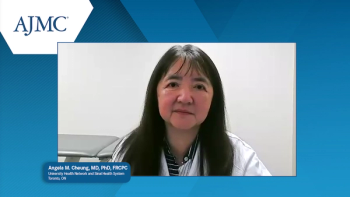
Establishing Standardization of Care for Endometriosis Management
The panel shares recommendations for standardization of early education regarding endometriosis.
This presentation is brought to you by Myovant Sciences.
Tara Hilton: One thing we’ve thought about in our community is, “How great would it be if we could integrate some of this information around endometriosis all the way into high school health programs or maybe physical education programs?” We all learn about things like sex and menstruation all the way from fifth grade. What if, at some point, we determine where it’s appropriate, whether it’s middle school or high school, and maybe that information is made available because it’s so common? Education and resources in the schools would be highly valuable.
Another thing I’d love to see to get past some of the stigma is maybe a score-based checklist of symptoms, where your school nurse or someone that you have access to has a yes-or-no checklist that gives a scored weight, and if you’re a certain score, you send home a note saying, “There’s a chance. Maybe you should talk to your doctor about endometriosis.” Just like you get your hearing and eyesight [checked]. That removes the stigma of what a bad period is. “Oh, you’re just being weak.” It is truly score based and removes any bias. We brainstorm things like that. Because you guys are the experts who are there to treat it and cure it, and whatever may come in the future. But until then, for awareness, that would drastically help.
Lastly, awareness campaigns are so valuable. When I started this journey, I was on my own. In 2006, I was finally diagnosed. I started working with some of these national organizations in 2014, speaking in Washington, DC. But even from then until now, there were endometriosis commercials on TV. Friends and family would call and say, “Oh, my gosh. I saw an endometriosis commercial.” They started putting together what advocacy groups, doctors, and big organizations were striving to do and tying it together with what they’re seeing on TV.
It also helped us overcome that uncomfortable conversation that I have endometriosis. People are very private about that, or have been historically. Sometimes it’s uncomfortable to talk about that. The more that these awareness campaigns put it out there, it creates a level of comfort. More people fighting endometriosis are starting to come out of the shadows, saying, “I have that too.” I love the awareness. I love seeing some of this grant money put toward it. Awareness campaigns are highly valuable as well.
Maria Lopes, MD, MS: I agree. Amber, what do you think? Would you use some of these tools in your practice?
Amber Hagen, NP: Absolutely. Tara, I love the idea of the school nurse having something in their office, such as a sign. You said that when your period came, you’d spend a day or two in there with a heating pad. Why not have something on the wall for these young girls to look at and say, “That really is me” or “I have that” or “My friend has that,” and then hoping they can have that communication with their mom or whoever their caregiver is at home and start that discussion. I’m thankful that my mom had endometriosis and knew the minute I started my periods and it was miserable that [endometriosis was a possibility]. She was like, “Let’s go,” and we went right to the gynecologist. I’m thankful for that. But there are so many girls who don’t have that or their mom’s experience. They don’t know that. They hear, “Grandma had painful periods, and I had painful periods. That’s just how it is.”
Having something like that in the schools would be so beneficial, because we’re seeing girls as young as 12 or 13 years old who have had their first periods and are missing school already. They don’t know, and their mom is bringing them to me and asking, “What’s going on?” I say, “It very well could be this.” They don’t even know what it is. Starting education early would be very beneficial to a lot of girls instead of waiting 6 or 7 years until they’re 20 years old and out on their own, finally seeking help, and realizing this could have been diagnosed and managed so much earlier instead of such a long time of them being miserable and their quality of life suffering.
In my practice, with every annual visit or every new patient, I always ask, “How are your periods? Are they painful? Are they short? Are they happening too often? How is intercourse? Is it painful?” And they’d be like, “Why did you ask me that? No one has ever asked me that question before.” That starts that whole conversation. I developed that bond and made so many more diagnoses, even with those simple questions, that as a provider, I’d think a lot more providers would ask. But that’s something I’ve found very beneficial to my practice.
Maria Lopes, MD, MS: Absolutely. As a payer, I also think about standardization with electronic medical records so that some of the questions you’re asking become consistent and part of an intake form. If patients answer yes, or if you’re following patients and the symptoms are getting worse, that should provide for at least education or more targeted focus on those symptoms that may lead to earlier treatment and intervention, particularly when there are treatment options that matter and disease-modifying options.
Transcript edited for clarity.
Newsletter
Stay ahead of policy, cost, and value—subscribe to AJMC for expert insights at the intersection of clinical care and health economics.






